Meet the men proudly standing up for women’s rights

Harrison Ochieng' distributes pads to women and girls in Mukuru kwa Njenga slums, Nairobi on September 22, 2021. He says he does this to change men's perception towards menstruation and attract male legislators' attention so that they can formulate or support policies that would end period poverty.
What you need to know:
- At a time when women’s rights are under threat globally, men, who themselves have specific gender needs, can reverse discriminatory structures, practices and behaviours through the roles they play.
- Meguarra Morans group uses chants, plays, folk and traditional songs to sensitise their community (Maasai) to stop FGM and child marriages.
- Concerned that discussing rape is considered an abomination in some communities, forcing survivors to keep mum about their ordeals, Nelson Kiptoo, 29, is offering them a chance to speak out in order to heal and get justice.
“Men, through their roles in the home, the community and at the national level, have the potential to bring about change in attitudes, roles, relationships and access to resources and decision-making, which are critical for equality between women and men.... Men should therefore, be actively involved in developing and implementing legislation and policies to foster gender equality, and in providing role models to promote gender equality in the family, the workplace and in society at large.” – Former UN Secretary General, the late Kofi Annan
At a time when women’s rights are under threat globally, men, who themselves have specific gender needs, can proliferate or reverse discriminatory structures, practices and behaviours through the roles they play and the attitudes they adopt.
Female Genital mutilation is rampant, girls are dropping out of school, sexual violence is on the rise and yet still, women are most likely to live in poverty. Women are without a doubt their own greatest champions, but many men are also lending their support. We spoke to male advocates who are showing how it’s done.
Saying no to period shaming, man donating pads on Nairobi streets
Mid-morning Wednesday, we meet Harrison Ochieng' on the streets of Mukuru Kwa Njenga, an informal settlement in Nairobi County.
On the left hand, he is carrying a box of sanitary towels, while the other has a pack of the pads ready to give out to a woman or girl in need.
He approaches some who shy away while others literary shout out at him or run after him to request for the donation. He doesn't have much today. He can only give out one pack, yet they need more than two.

Harrison Ochieng' (right) distributing pads to (from left) Zaiyun Abdul, Hellen Nduku and Janet Kanini in Mukuru Kwa Njenga, Nairobi.
Rose Mokeira, a vegetable vendor along the road, gets one pack but says she would have been happier with three to last her eldest daughter at least two months.
It was also a lucky day for Zeitun Ado.
"I don't work. So most of the time I either borrow the pads from my age mates, or use pieces of cloth. I bless him (Harrison).I only wish he had enough to give many other girls here," says Ms Ado who is jobless.
Increasingly, men are realising menstrual health isn't a woman's issue, pushing them to lead in ending period poverty.
Mr Ochieng' was born and raised here. He has seen girls condemned for soiling their clothes yet "menstruation is a biological process."
"I say no to period shaming," says the human rights defender.
While Ms Mokeira and Ms Ado make up the more than 300 women and girls who have benefitted from the works of his hands, Mr Ochieng' says the need is depressingly high.
To his target are street girls and women in Nairobi, whom he says "wonder whether the pads are edible as they have never seen them before."
Without well-wishers, Mr Ochieng's dream would be dimmed.
He started distributing the pads last July with support of Kenyans moved by his appeals on social media platforms. Some donate pads, others prefer to send money.
"I'm doing this work to change men's perception towards menstruation...to attract the attention of the male legislators so they can formulate or support policies that would end period poverty," he says.
"Why can't we have pads dispensed in toilets in public facilities?"
An assessment of the gendered effects of Covid-19 on households in Kenya, conducted last year, by UN Women et al. found that 73 per cent of women and girls in the informal settlements had a decreased or no access to menstrual hygiene products since the onset of pandemic. This was attributed to reduced income among the households.
As Mr Ochieng' strives to manoeuvre the hurdle of sustainability in supporting the menstrual health of the vulnerable girls and women, he hopes to one day wake up in a community where "a man will approach a girl who has soiled her cloth and hand her a pad or a fresh cloth, without making her feel like she has committed a crime for having her menses."
Speaking for women who fear talking about rape
Nelson Kiptoo Biama, 29, is a man on a mission.
Concerned that discussing rape is considered an abomination in some communities, forcing survivors to keep mum about their ordeals, he is offering them a chance to speak out in order to heal and get justice.
In 2017, Mr Biama started campaigns dubbed ‘End Rape Culture’ in Uasin Gishu County.
He says his motivation was to fight for women's rights and provide survivors of rape and gender-based-violence (GBV) a channel to pursue justice.
“Through Fabwil Care Foundation which I founded together with four colleagues, we have been working to end rape and GBV for the last four years,” he says.
Mr Biama observes that the society seems to have normalised rape and defilement, leaving survivors traumatised while perpetrators walk scot-free.
“It is perturbing to see how our sisters go through a lot of trauma but no one is talking about it,” he says.
With many women keeping silent on rape, defilement and GBV, he says it is important that they are sensitized on speaking out in order to get justice.

Nelson Kiptoo Biama says his motivation is to fight for women's rights and provide survivors of rape and gender-based-violence a channel to pursue justice.
“If you do your research today, you will establish that women do not talk about it. As men, we can stand up and fight for women’s rights,” says Mr Biama who together with his colleagues have visited 72 institutions across the county.
They also provide sanitary towels in schools.
He adds: “Having a chat with most women, you will realize they either have had an encounter with rape, GBV or defilement. If women can’t talk about it, then it is men who must come out to fight this.”
They have segmented their campaign audiences into parents, university and college students, secondary and primary schools and law enforcers among others, to widen their scope.
He discloses that the most perpetrators of rape are boda-boda operators while relatives feature a lot in defilement cases. Most of the affected are aged between 18 and 30 years.
“After visiting schools to talk to girls, we visit estates in Eldoret to converse with women so that they can fathom why it is important to end this vice,” he says.
They have partnered with Moi Teaching and Referral Hospital (MTRH) who offers counselling and legal services to survivors of rape and GBV.
“MTRH has a department called Care where we refer most of the cases we encounter,” says Mr Biama.
This year alone, they have solved 17 cases of rape.
Morans using chants, plays and folk songs to end FGM
In the Maasai community, female genital mutilation (FGM) precedes child marriages. Girls therefore, suffer the double tragedy, which further predisposes them to abuse of their right to education, economic development as well as sexual and reproductive health.
These harmful cultural practices are grounded in the decade-old customs that demanded of teenage boys to book a girl as young as 10 years and once he graduated from moranism, he could marry her. By then, she could have been initiated into womanhood with a cut.
Now, in Kajiado West, Kajiado County, 24 Maasai morans (aged 15-28 years), disheartened with the suffering of the girls, have joined hands to end FGM and child marriage in their community.
They have formed Meguarra Morans group through which they use chants, plays, folk and traditional songs to sensitise their community to stop the vices.
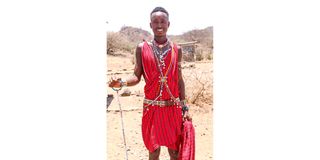
Ilmeguarra music festival group member Edward Loishoo.
Together, the nine morans and 15 young women pass messages such as Oloo mpapa masuma irmuran pee kirim dupoto amu kesidai enkisuma - an appeal to parents to take their children to school instead of marrying them off.
Moses Lenashe is happy to be part of these champions. Often, he is hit with questions such as “why are you wasting your time speaking against FGM and child marriage? “ But he knows there is a lot to lose by keeping quiet.
In 2016, while in Class Eight, he saw a young girl running to his school while crying uncontrollably.
He later came to learn that the seven-year-old was running away from her father who wanted to her marry her off to an old man to clear his debt. Luckily, the head teacher rescued her and enrolled her in a school far from her home.
“At the time, I told God ‘Please open a way for me to stop this’”, he says.
And he did. In 2017, he learnt about Meguarra Morans, which was five years old then, and joined.
“I completed Form Four in 2019, and I am a farmer at Ngurumani but every Saturday, I am at Illaramatak where we train. It is costly, but I sacrifice because I am committed to this work,” he says.
All they want now is national or county government’s support to buy costumes and facilitate their movements to reach the villagers who are always on the move to find water and pasture for their cattle.
Moses Laoi says they resorted to performances to create awareness against the harmful practices owing to their memorable impact.
“Singing attracts people’s attention. They can relate with the songs, chants or plays and after the performance, they will go away with the message stuck in their minds and hearts,” he explains.
He says their work has been impactful.
“Two decades ago, it was impossible to tell our fathers anything against FGM or child marriage, but now they can listen to us and commit to protect their daughters,” says Mr Laoi who is studying wildlife management and tour guiding.
Ms Florence Nolari joined the group to illuminate light and hope to the community.
“I consider myself as a point of reference to the parents and girls. I want them to look at me and ask themselves ‘why are we cutting our girls and marrying them off when we can educate them to live better lives?’ says Ms Nolari who is to join university soon.
Her desire is to see girls who have fallen pregnant resume learning instead of becoming wives.
“We will not stop sensitising the community until everyone sees the value of educating their girls,” she observes.
Edward Loishoo, another member of the group believes, their work has encouraged girls to refuse the cut.
“I know of girls in my village (Oldonyonyokie) who have stood their ground and refused to be cut. That motivates me to continue advocating against FGM,” says Mr Loishoo who joined the group in 2020.
Taib rehabilitating female drug addicts, sex workers and alcoholics
For female alcoholics, drug addicts and sex workers at the Coast, Taib Abdurrahman is godsend.
The man in his 40s, has spent half his life at the Coast rehabilitating them though the journey has faced challenges including threats from drug barons.
Through his initiative, he has reached 500 women some have been enrolled in colleges or opted to return to school. Out of the 500 reformed addicts, Deborah Were, who lived in Magodoroni, a renowned drug den in Kisauni is his heroine.
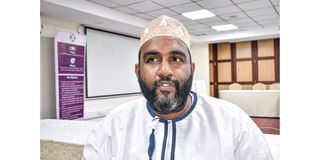
Reachout Centre Executive Director Taib Abdirahman. He is a champion in the war against drug and substance abuse in the Coast region.
“I am proud of her achievement, her zeal and passion. From an addict to a counsellor, we also have Mwanarusi Said who is giving back to the community, she’s in charge of a salon where we train reformed addicts,” he says.
Mr Abdurrahman who started this initiative in 2003, says out of the 500 women, only 100 have been trained and now earn a decent livelihood, instead of engaging in sex work or drug business.
“With Reachout Centre Trust, we help communities understand the issues of drug menace amidst us,” says the father of four who is the executive director of the organisation that rescues and rehabilitates drug addicts.
Having been born in a drug rampant area of Majengo in Mombasa, he was tempted into the ‘lifestyle’ due to peer pressure.
“However, my parents especially my mother, was my support system. She guided me on the dangers of using drugs. Were it not for her, I would have been an addict,” he reveals.
While his peers from Majengo dropped out of school and others got wasted due to drugs, he managed to complete his secondary education at Aga Khan High School and later enrolled for a certificate and diploma at Technical University of Mombasa. He later joined the University of Nairobi for a Bachelor of Counselling Psychology.
Mr Abdulrahman tells nation.africa that women are disadvantaged in society and need to be empowered.
He urges the government to develop tailor-made services for women to look into the issues of their rights so that they can get equal opportunities in politics and other sectors.
“It is hard for a woman to come out and say they are battling addiction. Our communities, religion and traditions abhor a vocal woman. But as men, we can create a platform, enabling an environment for women to talk freely,” adds the Aga Khan High School alumni.
Data from Reachout Centre Trust data shows that Coast region has 30,000 people addicted to drugs.
“We have 18,000 injecting drug users. Our programs also involve sensitizing addicts on the dangers of using drugs,” he says.
Offering financial support to women-headed families amid a pandemic
For 39-year-old Elly Opondo, has been putting a smile on women’s faces, especially those who live in slums and rural set ups.
This is something he did even as a young boy.
When he was not in school, he would be busy helping his mother sew clothes or making mats which would be sold to cater for their family needs.
“I grew up in Seme, Kisumu County, I often helped my mother in her grocery business and a number of chores,” says Mr Opondo.
When he joined Form One at St Antonys Missionary, Maseno, his passion to help women continued. He would spare time to volunteer at a neighbouring community-based organization which supported widows and orphans.
Later on in life, his passion to support vulnerable women led him and four friends to start the Champions of Peace organisation.
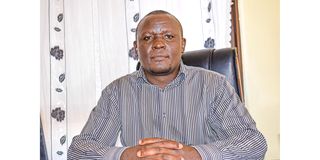
Elly Opondo at his Kisumu office. His organisation is currently working on a project offering financial support to women to start or boost their businesses amid the Covid-19 pandemic.
“The organisation has a program on women and youth empowerment where we offer peace building, and security programs,” says Mr Opondo.
In 2020, when Covid-19 struck women with small-scale businesses were hit most. Champions of Peace embarked on a project to support them financially.
The program runs in the Western counties of Busia, Kisumu, Siaya and Homa Bay and offers capital to women, especially in the slums.
“Most of the women in the slums and rural set up require less than Sh10,000 to start up or boost their business. Some may even require just Sh2,000 to start a grocery business, which may go a long way in helping them support their families,” says Mr Opondo.
Millicent Odhiambo, a single mother of four is among the beneficiaries who got support during the pandemic.
Her mama mboga business was on the verge of collapse and raising Sh2,500 to restock was a challenge.
By February 2020, she was contemplating to move to her rural home in search of greener pastures.
“I had started by seeking loans from our local women group, however all I could get was Sh2,500, which I wouldn’t have paid back in three weeks as expected,” she says.
Fortunately, she would be introduced to the Champions of Peace organization.
“I visited the offices in Kisumu and was awarded a loan of Sh10,000 to get my business back to life,” she says.
Her business picked up, enabling her to pay fees for her children without difficulties.
“I am now stable enough, thanks to the organisation for their continued support,” she says.
Judith Atieno, another beneficiary, says after learning about the program, she visited together with her three friends, and secured a loan of Sh5,000 each.
“That was back in November 2020 and my juice selling business was no longer doing well as most clients stopped buying fearing to contract Covid-19,” she says.
Mr Opondo says that to reach their target audience, they advertise their programs on local radio stations and churches.
The women often show up at the offices in large numbers.
He, however, states that to qualify for the cash, one must have a business idea.
“We do a follow up after three days to ensure the money is put to proper use,” he says.
Those who qualify for the loans get the cash sent to their phones via M-pesa. They are, however, not compelled to return the money.
They offer between Sh2,500 and Sh50,000 to eligible women.
Since the program began in June 2020, they have supported 760 women, spending Sh2.5 million
“Our aim is to ensure women-headed families continue to provide for their families,” he says.
Connecting fathers and daughters to end female genital mutilation
Elius Muindi appreciates his grandmother for making him the man he is today. He says his grandmother brought him up and singlehandedly and paid for his education.
As a result, he developed the urge to fight for women’s welfare.
Mr Muindi is currently the programs officer at the Kenya Men Engage Alliance, an organisation working with men and boys across the country to promote gender equality.
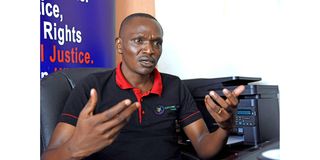
Elius Muindi during the interview at his Buruburu office in Nairobi.
The organisation has been at the forefront of gender transformation training. Currently, he discloses, they are championing a campaign dubbed Dads and Daughters that is being used to fight Female genital Mutilation (FGM) and child marriages.
The campaign involves girls aged between seven to 17 years, having one on one talks with their fathers.
“During these dialogues, the daughters open up to their fathers telling them the challenges they face including FGM and child marriages,” says Mr Muindi.
So far, they have reached 322 fathers and more than 400 girls in Migori, Kehancha, West Pokot and Marsabit.
“The campaign has resulted in tremendous changes where fathers tell other men on why they should support their daughters. Cases of FGM and child marriages have declined in areas where the campaign has taken place,” he adds.
The officer also reveals that the girls have posted impressive academic results as they are able to concentrate on their studies and not worry about FGM and child marriage.
The organisation is also undertaking another program aimed at enhancing women and young girls’ participation in leadership in Marsabit County. It involves mobilising elders to support women for political positions during the 2022 General Election.
About 100 widows in Makueni County have benefitted from the campaign. They are currently involved in poultry farming and bee keeping through courtesy of the organisation in conjunction with men and churches in the county.
“The widows now supply eggs and honey to Kibwezi, Makindu and Emali towns,” Mr Muindi says.
He observes that no tangible development can be achieved when half the population is side-lined, and calls on men to shun outdated cultural practices that only discriminate against women and girls.
FGM robbed me of my wife, I will fight it
Reso Dakane is a man mentioned in low tones in his village, Bula Sekondari in Tana River County.
The 52-year-old anti-FGM activist is revered by many. He also attracts hate from some elders who challenge his fight against female genital mutilation (FGM).
Mr Dakane was a number one supporter of the cut in his youthful days. His mother was an FGM surgeon and had conditioned him to believe that a circumcised woman was the price.
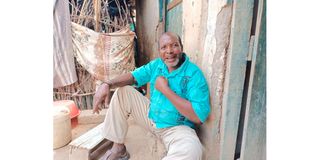
Reso Dakane, an anti-FGM activist during the interview with nation.africa outside his house in Bula Sekondari in Tana River County.
"Whenever my sisters came back from the bush, I joined in the dances and partying," he says.
He took part in awarding them for their bravery and was also among the men who scouted for potential brides.
When his time to marry came, his mother spotted a potential wife for him- a young woman who had independently sought for the cut against her parents’ wish.
Mr Dakane, however, later realised that whereas the cut was beautiful on the outside, the woman was destroyed on the inside.
"Every time we came together, she cried bitterly as it was painful," he says.
He would come face to face with the effects of FGM when his wife delivered their first child through caesarean section.
"I saw her fight the pain, whenever I visited her in the hospital; she would hold me tightly in pain, and I felt guilty," he says.
His encounter with Anti-FGM activist Sadiya Hussein, exposed him to the real conversation on what women went through.
Ms Hussein convinced Mr Dakane’s mother to abandon the cut. "The village lost a surgeon who turned into an activist," he says.
For Dakane, the mark of salvation was yet to sink in. A year later, his wife conceived their second child, but the complications resulting from the cut were not favourable to her condition.
Despite efforts by specialists to help her, Ms Dakane succumbed.
"The doctors said it was difficult to contain the bleeding since everything had been tampered with during the FGM operation," he says.
He buried his wife and took an oath against the cultural practice. Today, he remains a vicious activist against the practice.
"My firstborn is married in Marsabit, and she leads a vicious campaign against FGM there since she knows the pain," he notes.
Mr Dakane is among the few men actively involved in the war against FGM.
"I have kept a promise to my mother, that I will remain vigilant against FGM and agents of the cut. It is a promise I will keep to my grave," he says.
The activist appeals to organisations in the anti-FGM space to involve men in their discussions to strengthen the campaign.
By Moraa Obiria, Onyango K’onyango,Stephen Oduor,Winnie Atieno,Kamau Maichuhie and Angeline Ochieng’




